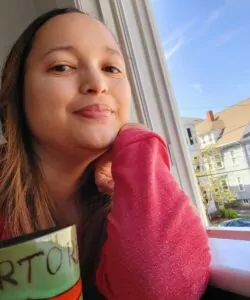
This article originally appeared in the Fall 2023 issue of On The Level.
How Darilys created community in the Spanish-speaking vestibular world.
By Darilys Matos Acevedo and The Vestibular Disorders Association
Feeling Invisible
I had gone undiagnosed for years. In the vestibular community, we know about the isolation you feel when you don’t know what it is. But even when I finally knew, it didn’t seem to make a difference that I had a diagnosis. It was still difficult for friends and family to understand.
That’s the whole thing with an invisible illness, you can’t see it. You also try not to let it be seen if you can help it.
Even when I had people in my life who tried to be here for me, they didn’t quite know how.
Finding Support
 Once I found the VeDA website, I immediately went to the information about coping.
Once I found the VeDA website, I immediately went to the information about coping.
I saw the Online Support Groups and that is where I went because I had found a lot of information already by myself, but what I really needed was support.
When I went to my first meeting I thought that I was just going to listen and probably wouldn’t talk for a while.
But honestly, I talked the first time because I related to them so much. It was such a safe space. I felt as if I had known them all along.
Being part of the group has been great. It taught me about a lot of different tools and gave me different perspectives. There were people that I could talk to and relate to. They could understand.
After all these years, I finally didn’t feel as alone. I felt supported.
Filling The Gap For The Spanish-Speaking Community
When the opportunity came along for me to do the same in the Spanish-speaking community, I wanted to give back.
When we first started the group, we were thinking it would be mostly Spanish speakers in the United States. What took us by surprise was that there’s been one, maybe two people from the US that have found the group (although I’m sure that will grow) but everyone else has been from Central America and from Spain.
I realized that VeDA is the only one doing this kind of work for the vestibular community worldwide. So, Spanish speakers worldwide were looking for support groups and they didn’t have any.
When we started our first meeting I had someone from Spain attend. She is in her 40’s and has had this condition since she was 18, and she was almost crying. She explained ‘I have never been able to talk about this with anybody. As soon as I heard about your group I had to come.’
We kept hearing the same thing from people in other Spanish-speaking countries: that no other support group, physical or online, exists in Spanish. That was our biggest surprise – that it was a bigger need than we realized.
A New Leader Emerged
Since we are a weekly meeting, we knew we needed at least one other co-host, and we recently found one through our meetings.
She was just born for the role. It’s funny because she was there from the very first meeting and she was just amazing. Her story is inspiring and she gives a lot of advice about attainable goals.
She’s also going to be the first VeDA volunteer that is a non-English speaker.
Balancing Community Care With Self Care
Now that I’m a support group leader, I’ve been trying to find a middle ground. I think my middle ground has been going to the online support group every week. I started with them and it means so much to me. I think that’s my way of making sure I can still get the support I need. That way I can give more support to others in my group.
A New Path
 I don’t think I would be where I am today if it hadn’t been for the groups that I joined and all the people that were there for me.
I don’t think I would be where I am today if it hadn’t been for the groups that I joined and all the people that were there for me.
I feel like, with the way the healthcare system has worked for me, if I hadn’t found that group I probably wouldn’t have found treatment yet. I wouldn’t have made the improvements I’ve made so far. I certainly would not have had the chance to help others the way I do now.
